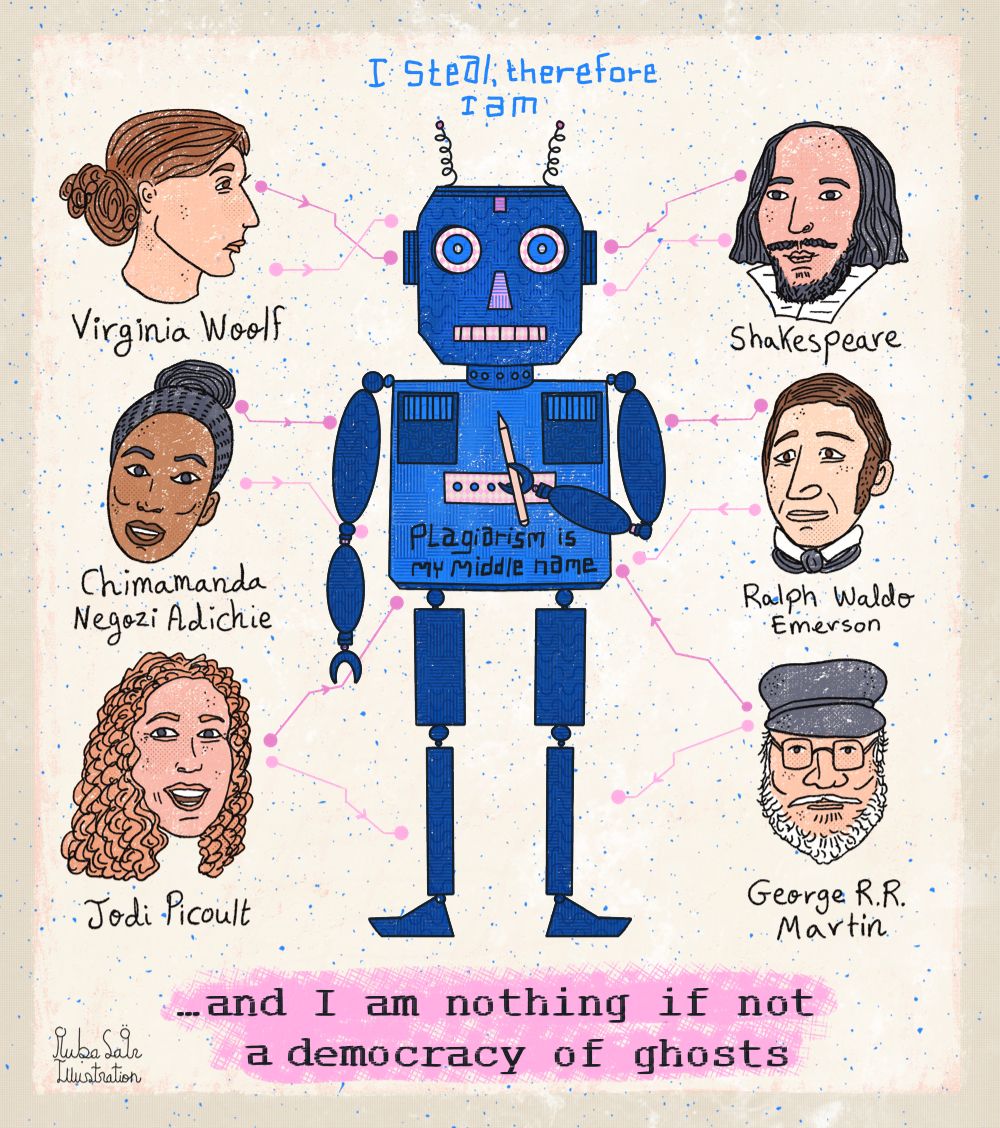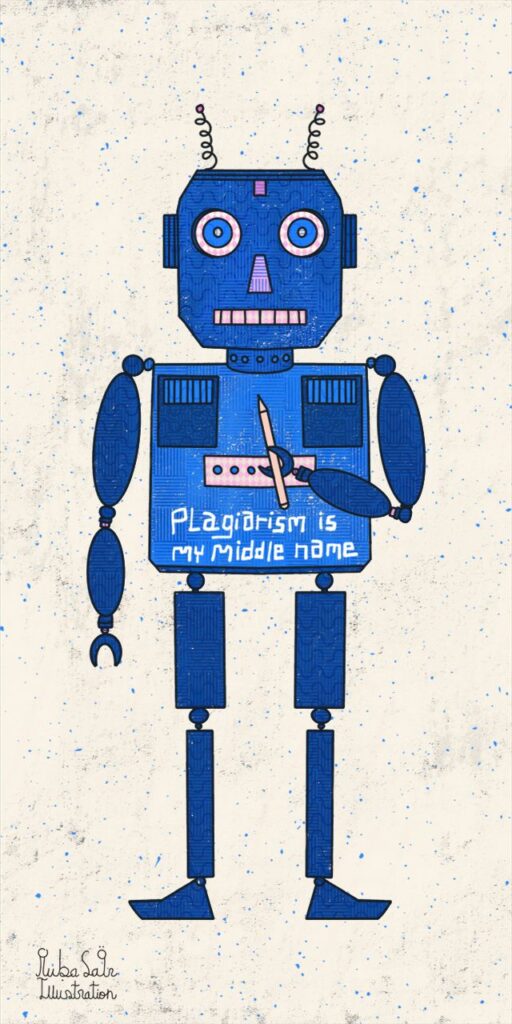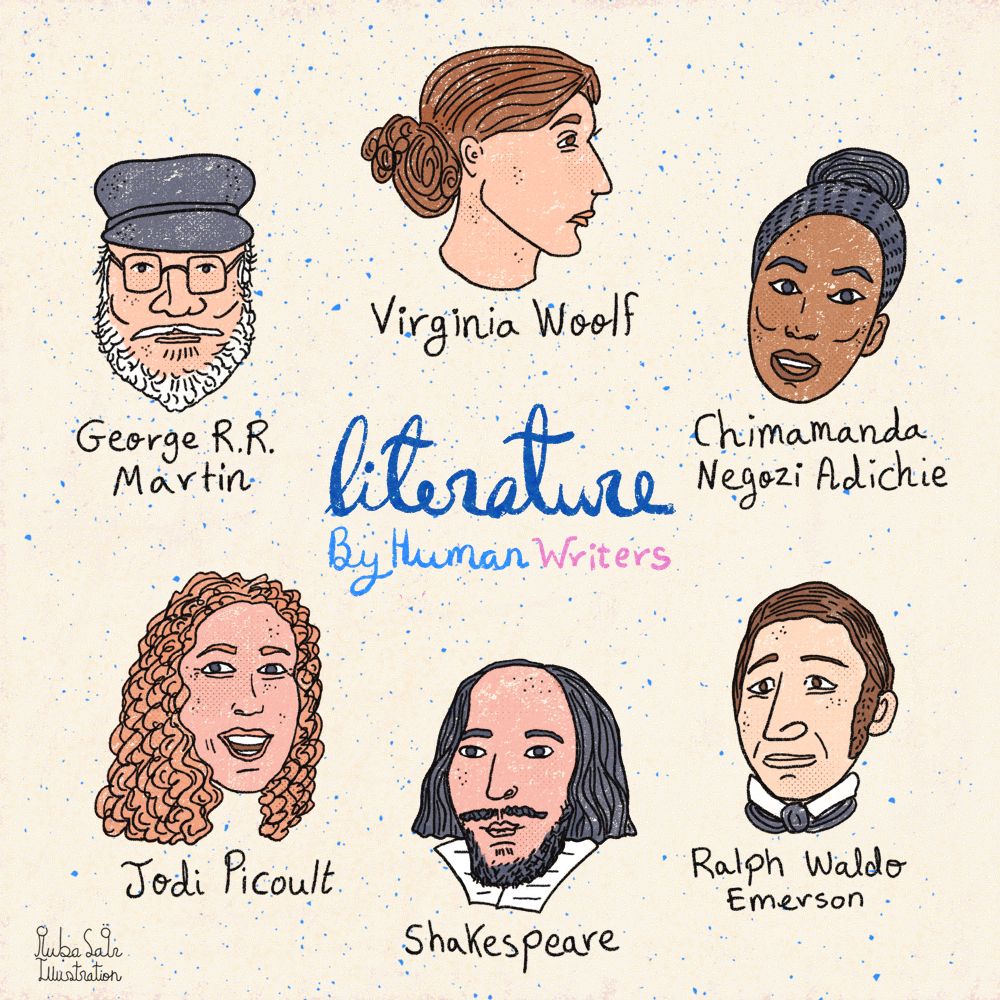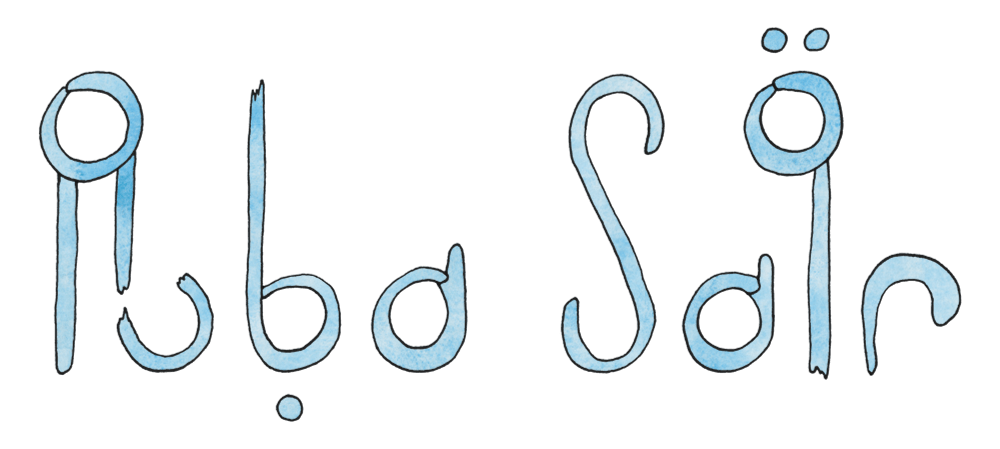Illustration about AI: Artificial Intelligence definitely not a ‘democracy of ghosts’
This hand-drawn, human-created line illustration about AI was inspired by a provocative phrase that showed up in an OpenAI “short story,” recently posted to promote its creative writing model.

AI v.s Human Intelligence
OpenAI’s recent claim that its new creative writing model is “good at creative writing” has garnered conflicting reactions from writers in different parts of the world.
Naturally, the idea that the AI has “written” the piece – posted a couple of weeks ago – has received fierce criticism by those who believe AI is nothing but a mass-theft machine.
To many, it is a programme that steals words from here and there to “Frankenstein” text stripped of the human hand… and soul.
I’ve also seen articles and videos contesting the use of the word “intelligence” in AI – as misleading.
AI cannot make a judgement call. Nor can it mimic the link between human intelligence, human feelings and heart, self-contemplation and the ensuing human wisdom. Ultimately, AI cannot – and will not – become wise. It does not go through the stages of human growth, which takes us from the foolishness of adolescence to the wisdom of our advanced years, especially after 40.
In a nutshell, AI does not have a soul, it does not suffer like we suffer, or experience joy like we do. Therefore, its forays into creative writing are the workings of an unsympathetic con-machine. A lifeless thief made of cold metal and cables, created by a group of elite tech leaders who do not have a moral compass.
Illustration about AI claiming to be a “democracy of ghosts”
OpenAI’s “short story,” entitled “A machine-shaped hand,” is about the grief that AI cannot feel. Still, it has the audacity to describe heartache with words, stolen from a large catalogue of literary works.
The piece also includes a “self-promoting” phrase (for AI has no “self” and no “heart”) that the company’s spin doctors and PR team could have deliberately planted in there.
In the story, the AI describes itself with these clichéd words: “… and I am nothing if not a democracy of ghosts.” Clearly, a blatant claim that twists the truth about what artificial intelligence really is – a mass theft of the human creative capital.
In this illustration I wanted to illustrate what that means in simple terms. I placed a metallic robot in the middle of the composition, with data flowing its way from 6 writers, 3 of whom are living authors. The robot’s motto is: “I steal, therefore I am,” a play on words for Descartes’ “I think, therefore I am.”

Let’s be clear: Creative theft does not make for a ‘democracy’
The spin here is that the theft of human writers’ original and copyrighted words is a “democracy of ghosts.” The human writers are the “ghosts.” And it, the AI, is the “democracy!”
How deceptive is that?
The foundation of democracy is that people make “conscious” decisions about their political lives. In other words, a democracy is not about stealing people’s votes and opinions behind their backs without their knowledge or consent.
Needless to say, when AI steals the words and life’s work of real human writers, it’s definitely not a “democracy!”
More accurately, it’s the mass theft of the human creative capital. Mass theft of the creative writings of thousands, if not millions, of writers who have the talent, the insight, the passion and the human connection with their human readers.
This looks like a deliberate attempt to change the narrative about AI. From one that is about stealing the human creative capital (i.e. literature and art) into the deceptive notion that this theft is an act of democracy.
Moreover, the statement seems to have been baked into the AI’s underlying programming. Or it could have been planted by the company’s PR team, after the fact, to brainwash readers into believing AI is “democratising creative writing” – which is definitely not the case.
FYI – according to online records, the “democracy of ghosts” phrase is from Vladimir Nabokov’s 1957 novel “Pnin.”
Illustration of 6 human writers
This subsidiary line illustration includes 6 famous writers, whose writings are part of the world’s treasure trove of literature. Three are from previous eras and they are: Virginia Woolf, William Shakespeare, and Ralph Waldo Emerson.
The 3 contemporary writers in this people illustration are: Chimamanda Ngozi Adichie, George Raymond Richard Martin (aka George R. R. Martin), and Jodi Picoult.
Picoult and Martin are actually part of a 2023 lawsuit alleging OpenAI’s ChatGPT programme has engaged in “systematic theft on a mass scale” of their literary works.
The suit, organised by the Authors Guild, includes 17 authors with names like John Grisham being part of the fold.
Created in Procreate with tweaks in Affinity Photo V2, the illustration includes some hand lettering that reads as follows, “Literature by human writers.”






Leave a Reply